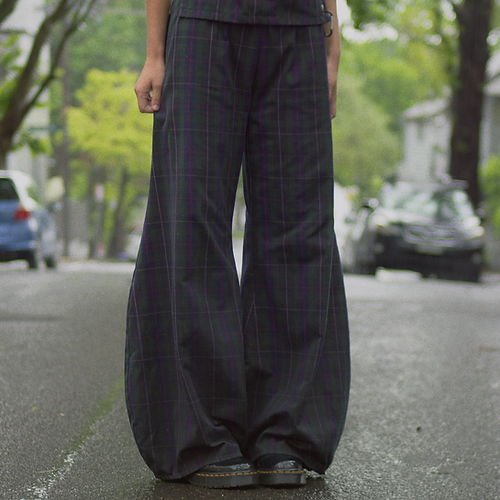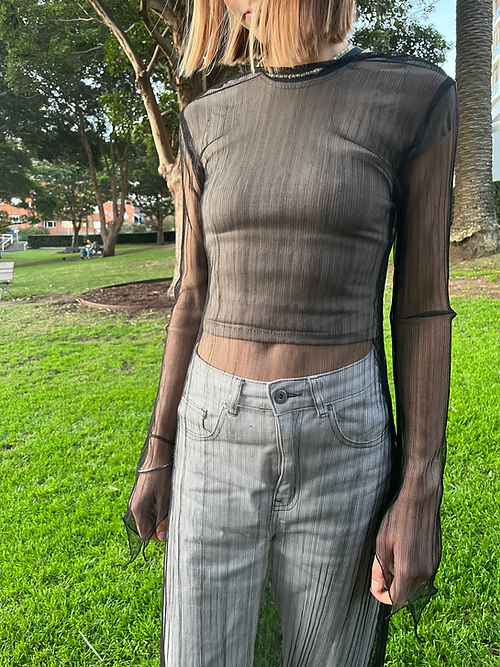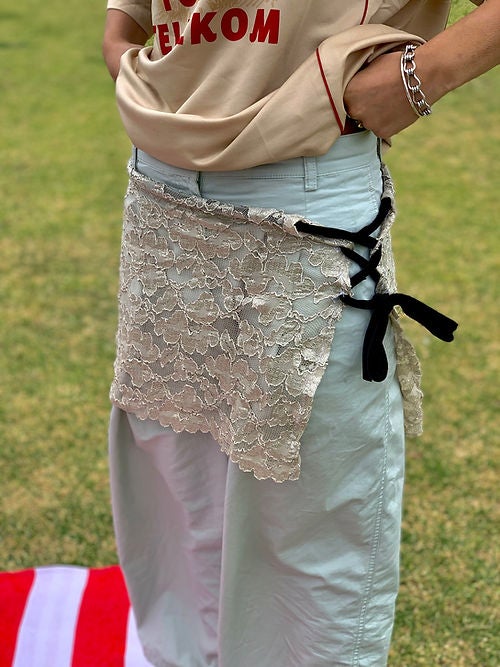“[It] Began As A Way To Express My Japanese Heritage”: Aussie Label Itadaki Is All About The Limitless Exploration Of Self
At Refinery29 Australia, we’re here to help you navigate this overwhelming world of stuff. All of our picks are independently selected and curated by the editorial team, but we may earn commission or other compensation from the links on this page.
When Australian-Japanese designer Mia Yoneda started "chaotically making face masks in 2020" for her friends and the local community, she had no idea that the endeavour would expand into the slow fashion label, Itadaki. A brand that "stands as a tribute to our collective families, to our loved ones, to all those that have nurtured each of our unique, authentic selves," says Yoneda. "Itadaki is not meant to be outrageous or trend-following, it is a way to express yourself outwardly to the world without having to say a word."
AdvertisementADVERTISEMENT
Raised in Australia, Yoneda explains that starting Itadaki allowed the young designer to feel close to her Japanese roots and to immerse herself in her culture "whilst not actually being present in it".
"Itadaki began as a way to express my Japanese heritage," says Yoneda, who explains that the name itself is a play on the word 'Itadakimasu', which is a Japanese word said before you eat and loosely translates to 'thank you for this meal'.
"I used to spend a lot of time in the back streets of Shinsaibashi, Osaka and would just sit and be captivated by the passers-by flaunting their unusual drapes and layering styles," she muses. Time spent observing people in the streets of Japan taught her about the ways personal style choices intersect with your sense of self. "Fashion can be a pivotal part of your identity and a way to express your individuality and emotions," she says. "You can make anything work if you want it to work, and that confidence is always the foundation of a stellar 'fit."
Her fascination with Japanese archetypes and their stark contrast led to a self-motivated study of the silhouettes of the modern Harajuku girl and the tradition-oriented geisha. "Although I am inspired by the voluminous silhouettes and the bold and unusual expressions of the modern Harajuku girl, I also admire the high-quality craftsmanship of the kimono and the traditions it carries with it," Yoneda explains. The detailed and precise construction of Japanese traditional textiles and layered eccentricities of modern Japanese streetwear is never far from her mind when she sits down to design her own collections.
AdvertisementADVERTISEMENT
The label also acts as an important creative outlet. "I have always enjoyed being creative," she admits. "When I was little, I used to spend hours on end cutting little tops and skirts out of decorative origami paper."
However, despite her clear interest in fashion, she never considered it a viable career option — that is until her aforementioned stint as a face mask maker during the pandemic. At a time when we all felt more isolated than ever, Yoneda discovered a way to maintain community, and it ignited a passion that would last well beyond any lockdown.
Although Itadaki as a label prioritises community, it's not something that the designer always has available to her when she's designing the brand's capsule collections. "It can get very lonely and most of the time I have no idea what I am doing," she admits. "But I think sitting with these feelings is important, and I have been doing a lot of reflecting recently on what I want out of Itadaki. It is definitely teaching me to back myself — you get what you put out", she says. It's this self-confidence that has legitimised her work in the eyes of critics.
Communicating and learning from others has allowed her to hone her craft, but she believes she would never have developed without encountering challenges that taught her "fantastic life skills that go beyond the brand and seep into all aspects of my life". Like the moments of solitude that birthed a boundless appreciation for her network of friends. "We do random shoots together on a whim, and they model and take photos for me," she says. "They are my inspiration and fuel excitement for projects and future collections."
AdvertisementADVERTISEMENT
“
"We cultivate a community of conscious consumers"
”
It's this limitless creative freedom that appeals to Yoneda the most; she doesn't know where Itadaki will be in 10 years' time but she imagines a natural evolution that reflects her personal journey. "Itadaki is more than just a fashion brand and I would love to see it evolve and seep into other creative industries," she explains. "There is so much creativity that goes into each post and every shoot and we take so much pride in the brand's image — [it's] an extension of myself."
Beyond her intimate circle of friends and creative collaborators, Yoneda intends to develop a wider community — one that reflects her love for slow fashion. "It is so important to me that we cultivate a community of conscious consumers that know where their clothes are coming from and can appreciate the process of garments made locally," she says.
One reason for this is the sheer amount of work that goes into creating a single garment. "First, you need to design it, then you have to create patterns for the design, grade the patterns for sizing, source fabric, [then] cut the fabric," she explains, adding that it's not until all these things have been completed that you can finally sew the actual garment.
"As a small label, you might be doing this all yourself or you may be working with local pattern makers, cutters and seamstresses," she continues. "When you are in the industry, it is so abundantly clear how much time, effort and skill goes into producing a single garment, but fast fashion has masked the true value of craftsmanship and our appreciation for quality clothing has dwindled since the onset of mass production."
AdvertisementADVERTISEMENT
She enthuses that small Aussie labels are making powerful strides in the push for slow fashion by offering Australians great local and slow fashion options "without compensating their unique, individual style". Ultimately, Yoneda believes there is power in numbers. "The more slow fashion labels there are, the greater impact we can have together on the industry".
Want more? Get Refinery29 Australia’s best stories delivered to your inbox each week. Sign up here!
AdvertisementADVERTISEMENT









